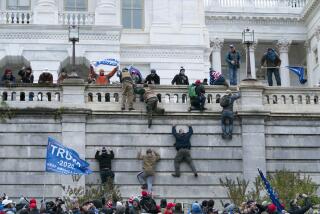Civil Liberties : The Cost of Fighting Terrorism
MILWAUKEE, WIS. — History offers no clear-cut lessons--with one exception. At times of high emotion--as in the aftermath of the Oklahoma City bombing--we should calmly and skeptically weigh proposals that strive to attain absolute security in a democratic society.
Although armed with guidelines, issued during the Reagan Administration, that allowed its director to order investigations of individuals who advocate criminal activities or violence, the FBI failed to anticipate the terrorist bombing of the Alfred P. Murrah Federal Building. In response, a frustrated President Bill Clinton wants to relax these already permissive guidelines, including a recommendation that the agency be allowed to wiretap and check hotel, credit and travel records of suspected terrorists without having to consider its possible violation of the Fourth Amendment.
Yet, the FBI’s role during the Palmer raids in the early 1920s and during the Cold War underscores the potential costs of such proposals to a free society.
After the 1917 Russian Revolution, Washington feared that American Communists might promote upheaval here. In January, 1920, Atty. Gen. A. Mitchell Palmer authorized mass dragnet raids ostensibly to deport alien radicals under a 1918 immigration law. Federal agents arrested more than 6,000 people attending meetings of the Communist Party and the Communist Labor Party.
The Palmer raids precipitated a backlash when abusive practices associated with them became known. For example, federal agents had no authority to plan and conduct the raids, since enforcement of immigration laws was the responsibility of the Immigration Bureau; citizens as well as aliens had been detained, even though only alien radicals could be deported, and the ensuing interrogations violated long-standing rules providing for the right to counsel during such proceedings, which sought to intimidate detainees into incriminating admissions.
These abuses, however, pale beside those of the Cold War era. Dating from 1936, FBI officials launched an intensive effort to monitor and contain “subversive activities.” This involved, as FBI officials privately conceded, “clearly illegal” investigative techniques: break-ins, wiretaps, bugs, mail opening.
In contrast to the Palmer raids, the abuses did not become publicly known, because FBI “intelligence” investigations uncovered only derogatory personal and political information, not violations of federal statutes, and because the FBI’s illegal methods precluded prosecution.
The subjects of FBI interest, furthermore, went far beyond Communist Party officials or suspected Soviet agents. The activities of many prominent Americans--among them, Adlai E. Stevenson, Henry Cabot Lodge, Eleanor Roosevelt and Martin Luther King Jr., as well as Ernest Hemingway, poet Archibald MacLeish, composer Leonard Bernstein, folk singer Pete Seeger and columnist Joseph W. Alsop Jr.--were monitored. The FBI’s interest in “writers, lecturers, newsmen, entertainers and others in the mass-media field” stemmed from their being “in a position to influence others against the national interest.”
This alarmist conception of a national-security threat led FBI Director J. Edgar Hoover to authorize, on June 21, 1951, a covert Sex Deviates program to purge any suspected homosexual from the federal payroll. FBI officials also sought to purge “sex deviates employed either by institutions of higher learning or law-enforcement agencies.” At the same time, the FBI director launched a code-named “Responsibilities Program,” which provided information to state governors to enable them to fire suspected “subversives” from state agencies and public universities. The program was discontinued in 1955, but only after some governors failed to honor Hoover’s condition of secrecy by disclosing that the FBI had provided the damaging information.
These were not the sole occasions when non-criminal information was purposefully disseminated outside the executive branch. In February, 1946, FBI officials launched an “educational” campaign to “influence public opinion.” Then, beginning in 1956 and expanded in the 1960s, FBI officials secretly instituted a series of COINTELPROs targeting radical organizations. Both efforts relied on leaking derogatory personal and political information to selected members of Congress, valued congressional committees, and trusted reporters and columnists on the strict condition that the recipient of the information not betray its origin.
Thus, what might have begun as an “intelligence” program to anticipate espionage evolved into a massive political-containment effort. One result was that FBI investigations were no longer predicated on gathering evidence for use in possible prosecutions.
At times of crisis, the quest for evidence of a foreign conspiracy served to intensify the demand for such evidence. Despite the scope and intrusiveness of the FBI’s surveillance of radical activists during the 1960s, Presidents Lyndon B. Johnson and Richard M. Nixon became dissatisfied when the FBI was unable to document that radical critics were actually under foreign control or direction.
Johnson and Nixon first turned to the CIA (Operation CHAOS) and the National Security Agency (Operation MINARET) for additional assistance. Then, in June, 1970, Nixon convened a special interagency task force to assess the limitations of U.S. intelligence gathering. The task force formally proposed that the President authorize a series of “clearly illegal” investigative techniques: break-ins, increased uses of wiretaps and bugs, mail opening, and intercepting international messages. Sensitive to the political risks, Nixon did not officially sign the authorization memo. Instead, he had a White House aide sign it--thereby ensuring presidential deniability.
Nixon’s actions in authorizing illegal activities, revealed during the Senate Watergate hearings, was ultimately included in one count of the House’s resolution to impeach him. Ironically, proposals in violation of the Fourth Amendment, considered an impeachable offense in 1974, are now being pushed as necessary to meet the threat of domestic terrorism.
More to Read
Get the L.A. Times Politics newsletter
Deeply reported insights into legislation, politics and policy from Sacramento, Washington and beyond. In your inbox three times per week.
You may occasionally receive promotional content from the Los Angeles Times.










